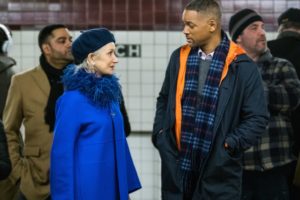Collateral Beauty screenwriter Allan Loeb phoned The Movie Mensch for an exclusive chat about his new film that features an all-star cast that includes Will Smith, Helen Mirren, Keira Knightley, Michael Pena, Kate Winslet, Edward Norton and Naomie Harris. The writer talked about the joy of penning a project that would attract that level of talent, the difficulty in presenting a story that weaves an emotional web full of surprises, while simultaneously not revealing too much of the surprises as the story progresses.
Smith’s Howard is a successful advertising exec who crashes hard when his young daughter dies of cancer. He is lost and meandering through what is left of his life when his co-workers/friends decide to find the most unorthodox of ways to intervene in his life. What is real and what is fate are just a few of the questions that are raised throughout Collateral Beauty that Loeb presents in his screenplay.
Read on to discover our exclusive insight into the creation process of the story that compelled one of the best casts of the year to join forces to tell his tale.
The Movie Mensch: You certainly have one incredible cast at your disposal. As the names started coming in, and the yeses started coming in, what was your thoughts and feelings about working with this cast?
Allan Loeb: You know, if was obviously a dream come true cast. It was nice … It was not only nice, obviously, that they connected with the story, and my script, but what really I thought was really extra special for me was that there seemed to be a hunger from these actors, and I think from other actors, to do original material. It’s very hard, very uphill to get original material made into movies. To witness this cast come together for original material made me feel so good about the whole concept of it might be difficult to get a studio to green light this type of original drama. But, it’s good to know that the talent out there, the directors, filmmakers, and actors, are hungering for it, because that’s really the only way to drive it home in this climate.
The Movie Mensch: One thing I marveled at that you did as writer is this could have been a “schmaltzy” look at what these people are going through, but it isn’t in the least. It’s very straightforward.
Allan Loeb: David Frankel directed the movie. He really wanted to capture New York in a very kind of hopeful way without going to that place of, like you said, schmaltz.
The Movie Mensch: Another thing that struck me too about the script is how … I don’t want to give too much away, but there are reveals, and there are mysteries, and as the story is kind of going along … Was that the challenge to kind of not reveal too much, and just give a little bit here and there over the course of the story so that over time the punch emotionally kind of delivers as much as it can?
Allan Loeb: Absolutely. It’s a constant tightrope you have to walk. You want to give enough that it makes sense when you reveal a twist, or a moment that might be unexpected, but you don’t want to give too much as to sell it out. You don’t want to be too predictable, but you do want it to make sense and be satisfying.
The Movie Mensch: Now, this is a multi-layered story. One thing I was really fascinated and curious about is the inspiration. Where did this come from for you?
Allan Loeb: It really was an idea that was just in the back of my mind. The germ of the idea was about someone who had suffered a loss, and was writing letters to the universe, and what if the universe responded to the letters. The original concept that kind of plagued me for a few years before I just kind of had to focus on it and develop it out to the movie that we have now. That original kind of concept stuck with me for years, and tugged at me until I really had to drop everything I was doing in order to just see where that went.
The Movie Mensch: The thing that also got me too is the characterizations, the choices made for the three forms that we see — death, time, and love. Death is not something heavy-handed, and that might have been something that would be easy to do. Time seems a bit angry at his reaction to time. Time could have been something so careless because it is so free, and there is so much of it. Your choices, if you could kind of talk a bit about your choices for these three elements that are hugely part of your story, and part of our lives.
Allan Loeb: Yeah, it definitely was one of those situations where when I was … Originally, the very first few drafts when I was writing time and writing love and death, I had made some choices. Death was a man, like an older man with a white beard. I looked at it and said, “We’ve seen that. That’s something that is expected. How do we make it not expected?” I did a concerted effort to kind of make it unique. I landed on what if death were Helen Mirren? Then what if time were young? What if time were like a teenager who has a skateboard, and might be a little angry, and tough. I thought, “Let’s do that.”
The Movie Mensch: Of course, I adore the fact that love is Keira Knightly because nothing says love like Keira Knightly.
Allan Loeb: You can’t argue with that.
The Movie Mensch: The film is set around Christmas. It is notorious time of year for people who aren’t on the happier side of the emotional spectrum to have a really tough time. It appears to be a really conscious choice on your part. Why set some of this story during the holidays?
Allan Loeb: I think it’s the chicken and the egg. I think there is a genre out there, a sub-genre of drama known as holiday fables. We can go back to Christmas Carol, Miracle on 34th Street, It’s a Wonderful Life. That’s something that people long for, I think, in movie theaters, and to watch with their families during the holidays are these fables. If you question, “Why, then were these fables created during the holidays even 50 years ago,” that speaks to the loneliness and the intensity of holidays. I think the highs are higher and the lows are lower around the holidays. It’s a very unique time of the year. Therefore I think the Christmas fable — holiday fable — was invented for it years and years ago. We’re not doing anything new here in terms of setting it at Christmas. We’re just kind of hopefully following within the footsteps of some great, great movies and stories.



